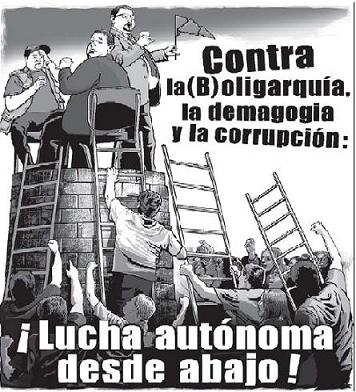Venezuela: The People’s Struggle is the Best Response to the Crisis!
Primary tabs
* Soon El Libertario #56 will be available in the street and on the Internet (www.nodo50.org/ellibertario). El Libertario is the voice of free ideas and independent social movements in Venezuela and Latin America. As a preview of its usual combative, irreverent and uncompromising position with regard to authoritarian power and oppression, here's the editorial:

All thorough media analysts agree about the increased vulnerability of the Venezuelan economy to the consequences of the world economic crisis. The question is obvious: how could our country be one of the most affected by the pressures of the global capitalist system if it has been claiming to build its so-called "21st-century socialism" for a decade? The answer is simple: because, contrary to speeches and shows, it has not gone in any direction different from the economic globalization that has prevailed in the last two decades on the planet.
In fact, Venezuela has deepened the capital flow role assigned to it: the “safe and reliable†sale of energy input on international markets. In this way, the country has even increased its dependency on the foreign consumption of our oil, a basic requirement of the industrialization and development that has strengthened the world capitalist architecture since the Second World War. That's why in the State’s invigoration of mining, the so-called firebrands concerned with the promotion of a "endogenous" economy have demonstrated familiar results while supplying folkloric anecdotes to entertain the population. It’s also familiar that, each time the government declares that it's promoting "food sovereignty," it’s increasing the quantity of imported food, its only possible subsidy for which is oil profits.
Despite the major economic bonanza of the last three decades and having almost total control of all of the state political and institutional apparatus, the Bolivarianist government has been incapable of promoting the structural transformations that deserve "positive" as an adjective or of significantly improving not only consumption, which is a capitalist indicator, as we know, but also the majority’s quality of life. As an extension of the defects of representative democracy, not as a break with it, Chavism as it really exists has once again repeated the perversions of previous governments during fiscal booms: usage of a large client and populist network, the super-sizing of the institutional bureaucratic apparatus, the sudden and grotesque enrichment of a new bureaucracy in power and the fomentation of corruption at all levels of public administration. Now here we are in a lean period that will also have to bear the excesses of all the Juan Barretos and Diosdado Cabellos in red berets feeding off their respective ministries and departments.
As the Chavista pact with Gustavo Cisneros has already demonstrated, the crisis will lead to increased confrontations among the powerful, who will combine their interests while those of us at the bottom pay the price. This confusing and polarizing spectacle, however, will provide an opportunity for us oppressed to stand up for ourselves again by fighting for our rights without the “help†of self-proclaimed media representatives. In this necessary recomposition of the social panorama, antagonisms will rise to their real magnitude, and the rulers, bosses and privileged classes will take advantage of or bet on them because they have everything to gain.
In this context, the government is carrying out an aggressive improvement of its mechanisms for controlling the society and further concentrating its power. Taking advantage of the commotion and uncertainty of the world economic debacle, the government has a unique opportunity in the excuse of the crisis to implement authoritarian and regressive measures against labour, social and political rights. As has been mentioned before, the best way to keep our bearings and resist the State’s shock policy is to understand the nature and causes of what is happening to us. In the Venezuelan case, it's a burned-out political model—populist caudillismo, changes decreed from above—and an economic one—dependency on oil—which the so-called “Bolivarian process" has not remotely superseded but only sanitized.
However, this crossroads is also a chance for real and profound transformation of our society. Those of us at the bottom must dispense with opportunistic leaders and their short cuts and gradually construct a vast independent, belligerent and popular social movement beyond all political parties and agencies of power. We must dismantle the pseudo-revolutionary fallacies of the new State bureaucracy one by one as we reject the influence and actions of political parties inherited from the past. We must recognize all the factors that limit our individual and collective advancement and create proposals, not for taking power, but for washing the social fabric clean of it. We must promote experiences and initiatives that generate a different culture here and now and form non-coercive and horizontal connections and bridges with all sectors in the struggle.
The mobilization and solidarity of the people against the crisis of the elite!
El Libertario - ellibertario@nodo50.org
www.nodo50.org/ellibertario (in Spanish, English & others languages)









